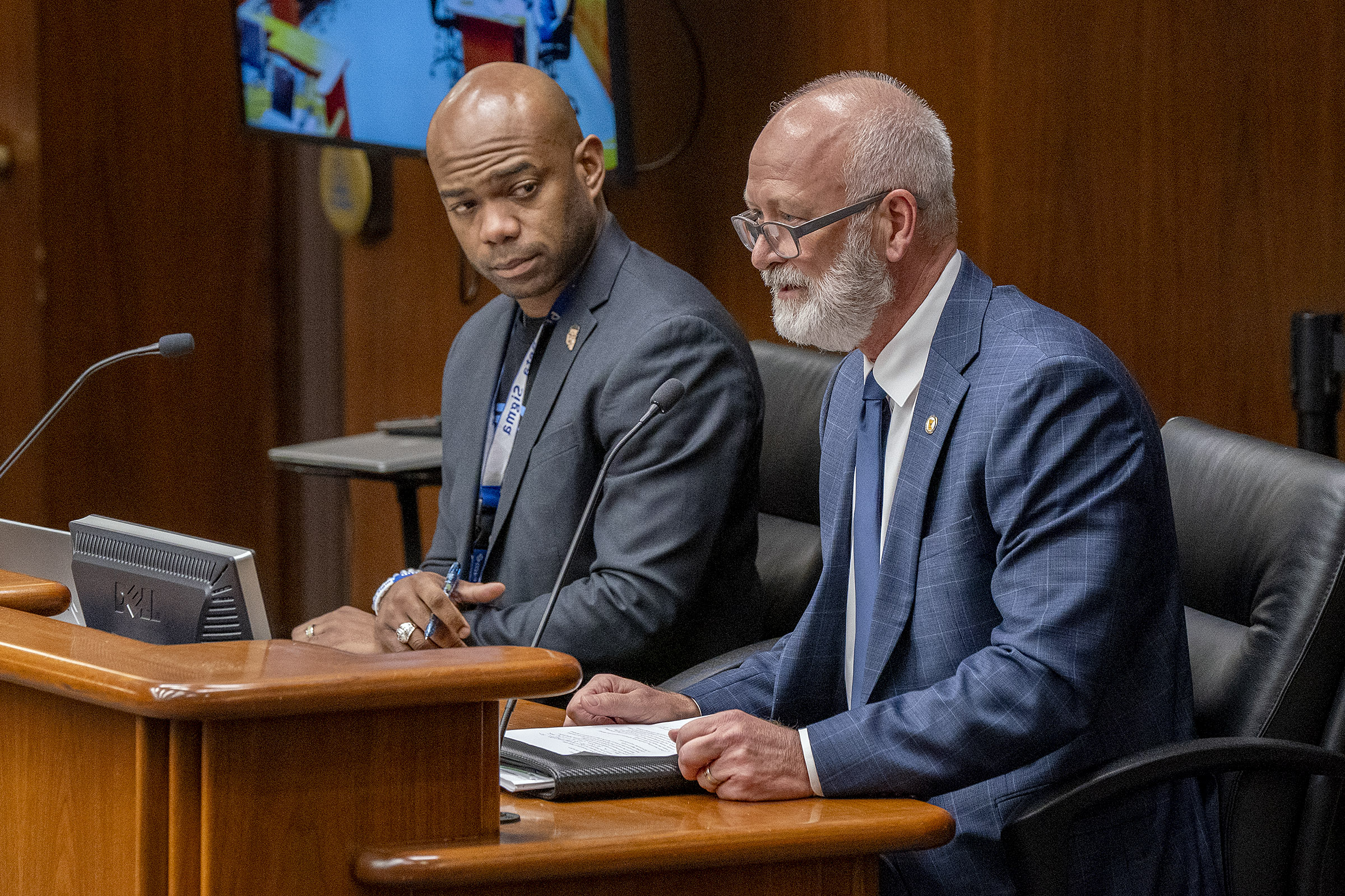Clarification to school resource officer law could be at hand

A fix could be coming for a 2023 law whose interpretation led to uncertainty that some said put Minnesota students at risk.
Except in cases of preventing bodily harm or death, the law states a district employee, including a school resource officer, “shall not inflict any form of physical holding that restricts or impairs a pupil's ability to breathe; restricts or impairs a pupil's ability to communicate distress; places pressure or weight on a pupil's head, throat, neck, chest, lungs, sternum, diaphragm, back, or abdomen; or results in straddling a pupil's torso.”
Specifically, agencies and school districts sought clarification around the use of certain choke holds and face-down prone restraints resource officers can place on students.
Because of the perceived ambiguity in the law, more than 40 police departments pulled officers from participating school districts last fall as a result. In an opinion, Attorney General Keith Ellison said the law did not change when officers could use force.
Sponsored by Rep. Cedrick Frazier (DFL–New Hope), HF3489, aims to provide clarity.
Approved 7-5 by the House Education Policy Committee Monday, it would, in part, update use-of-force standards for school resource officers. It now moves to the House Public Safety Finance and Policy Committee, which plans to hear the bill Tuesday evening.
“This bill creates a process for all the stakeholders to be heard,” Frazier said. “This bill creates a process for comprehensive uniformity and transparency throughout the state. We don’t have that right now. As we’ve had these conversations with stakeholders, the one thing I know for certain is that they’re missing each other. People in one corner screaming, another corner screaming, but they’re not hearing each other. That’s an important part of this process. That we get them together and we have them understand what the concerns are. At the end of the day, they all want to create the safest environment possible for our kids.”
The bill would remove language specific to contracted security and school resource officers placing restraining holds on students.
Working with impacted Minnesotans including law enforcement agencies, local government, schools, community members and youth organizations, the Peace Officer Standards and Training Board would need to develop uniform training standards for school resource officers throughout the state. In fiscal year 2024, $150,000 would be allocated for this purpose, and $490,000 in each fiscal year from 2025-27.
Per the bill, the board must consider:
- issues to be addressed in a school resource officer contract;
- considerations for the proper use of force on school grounds, including the limitations on restraints, and response tactics and strategies that minimize the use and duration of prone restraint, other physical holds of students, and the duty to render reasonably prompt care to a person who an officer physically holds or restrains;
- alternative procedures that can be used to de-escalate conflicts in schools and students and others in crisis;
- ensuring school resource officers are being utilized appropriately and not for school disciplinary purposes;
- building constructive police relationships with students, administrators, and educational staff;
- proper procedures for protecting student data; and
- when a refresher training course is required.
“This SRO bill that’s in front of the committee today represents a comprehensive proposal. It creates clear duties for SROs in schools,” said Public Safety Commissioner Bob Jacobson. “It provides training requirements that are focused on school settings and working with students. … The one that I believe is most important is focusing on building constructive relationships between SROs, students and educators. This bill makes it clear that SROs are not allowed to be allowed in school discipline.”
Khulia Pringle, Minnesota manager of organizing and outreach of the National Parents Union, questioned why Minnesota restricts choke holds and face-down restraint for adults but would let an SRO use these techniques on school children.
“The legislation passed last session was a no-brainer, and now we are playing politics with the lives of children,” she said. “We believe the language is clear in the current bill. We also support parts of the bill that does offer SRO specialized training and some accountability for SROs in schools.”
“I think that all of us in the room, we have a common goal of working with kids and making sure kids are safe,” said Rep. Ben Bakeberg (R-Jordan), who voted against the bill. "And we just have to start out from that foundation that we want kids to be safe no matter where they’re at.”
Related Articles
Search Session Daily
Advanced Search OptionsPriority Dailies
Speaker Emerita Melissa Hortman, husband killed in attack
By HPIS Staff House Speaker Emerita Melissa Hortman (DFL-Brooklyn Park) and her husband, Mark, were fatally shot in their home early Saturday morning.
Gov. Tim Walz announced the news dur...
House Speaker Emerita Melissa Hortman (DFL-Brooklyn Park) and her husband, Mark, were fatally shot in their home early Saturday morning.
Gov. Tim Walz announced the news dur...
Lawmakers deliver budget bills to governor's desk in one-day special session
By Mike Cook About that talk of needing all 21 hours left in a legislative day to complete a special session?
House members were more than up to the challenge Monday. Beginning at 10 a.m...
About that talk of needing all 21 hours left in a legislative day to complete a special session?
House members were more than up to the challenge Monday. Beginning at 10 a.m...